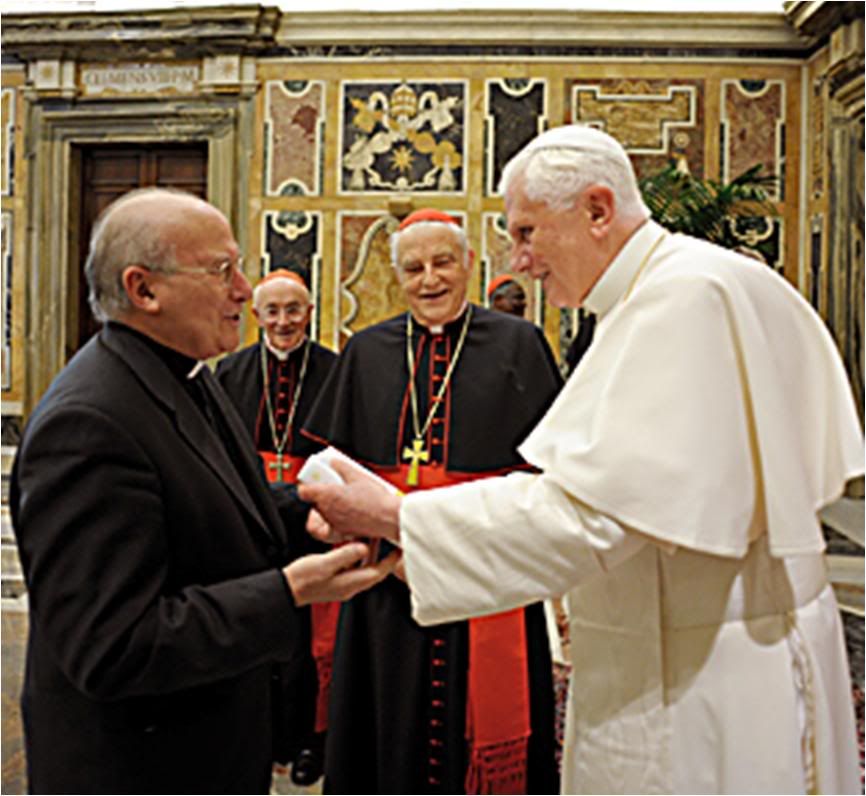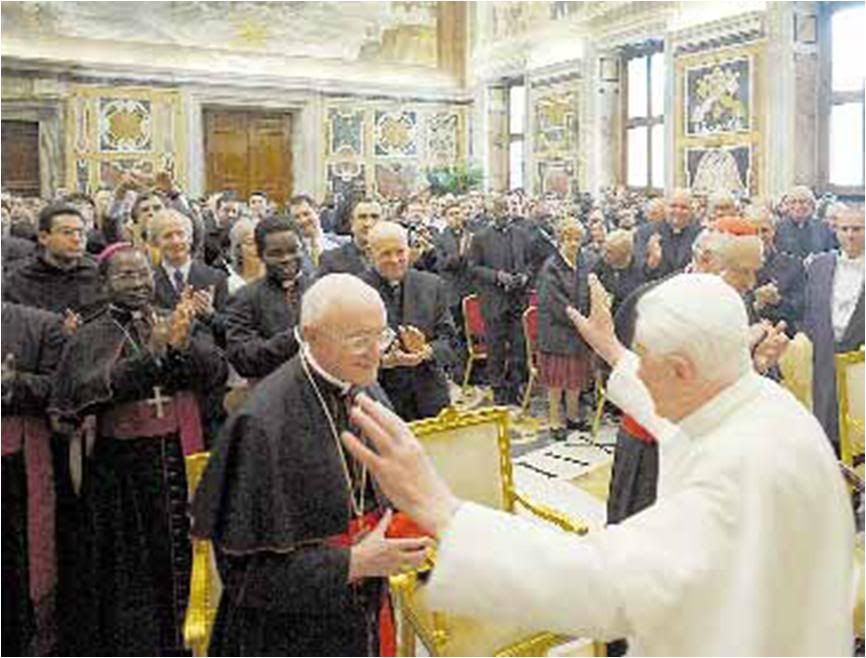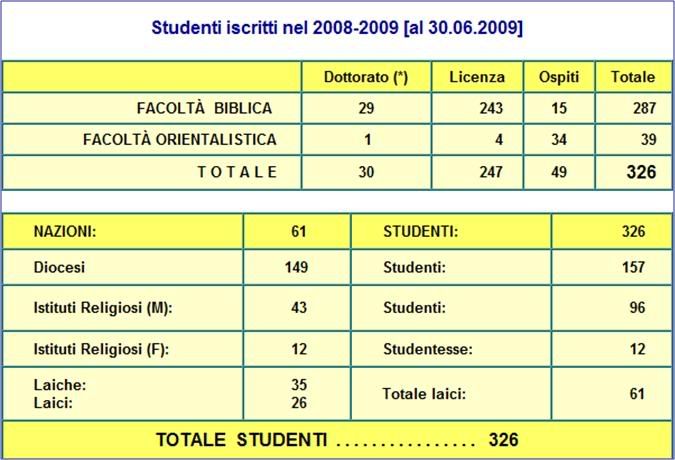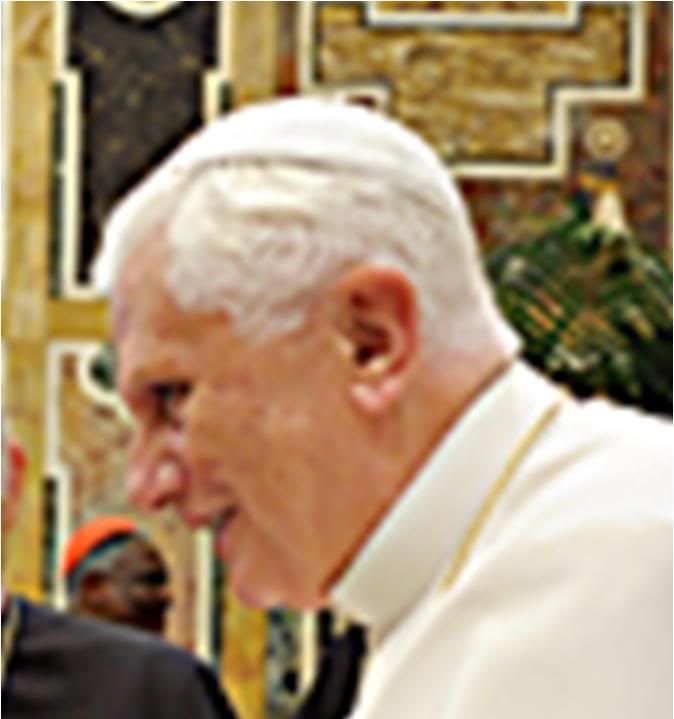 Pope hails Biblical Institute
Pope hails Biblical Institute
on its centenary year


VATICAN CITY, 26 OCT 2009 (VIS) - This morning the Holy Father received members of the Pontifical Biblical Institute which is currently celebrating its centenary. The institute was founded by Pope Pius X.
Benedict XVI greeted Cardinal Zenon Grocholewski, prefect of the Congregation for Catholic Education, and expressed his thanks to Fr. Adolfo Nicolas Pachon S.J., superior general of the Society of Jesus (Jesuits).
The Jesuits, "not without considerable effort, invest financial and human resources in running the Faculty of the Ancient East, the Biblical Faculty here in Rome and the institute's office in Jerusalem", said the Pope. He also extended his greetings to include the rector, professors and students of the Pontifical Biblical Institute.
"This centenary represents a goal and, at the same time, a starting point", said the Holy Father.
"Enriched by the experience of the past, you continue your journey with renewed enthusiasm, aware of the service to the Church that is asked of you: that of bringing the Bible into the life of the People of God that they may know how to face the unprecedented challenges that the modern age poses to the new evangelisation.
"Our shared hope is that, in this secularised world, Sacred Scripture may become not only the heart of theology but also a source for spirituality and for vigour of faith among all who believe in Christ".
The Holy Father recalled that the Vatican Council II Dogmatic Constitution
Dei Verbum highlighted "the legitimacy and importance of the historical-critical method, identifying therein three essential elements: attention to literary genres; study of historical context; and the examination of what is often called 'Sitz im Leben'. ...
 Here is a translation of the Holy Father's remarks:
Here is a translation of the Holy Father's remarks:
REMARKS TO THE PONTIFICAL
BIBLICAL INSTITUTE
Eminent Cardinals,
Most Reverent Superior-General of the Soceity of Jesus,
Distinguished Rector,
Distinguished professors and
Dear alumni of the Pontifical Biblical Institute:
With true pleasure I welcome you on the occasion of the 100th anniversary of the foundation of your Institute by my sainted predecessor Pius X in order to constitute, in the city of Rome - as mentioned - a center of specialized studies on Sacred Scripture and related disciplines.
I deferentially greet Cardinal Zenon Grocholewski, whom I thank for the kind words he addressed to me in your behalf. I likewise greet the Superior General of the Jesuits, Fr. AdOlfo Nicolas Pachon, and I take this opportunity to express my sincere gratitude to the SociEty of Jesus which, not without remarkable efforts, has deployed finaNcial investments and human resources to support the Faculty of the Ancient East, the Biblical Faculty here in Rome, and the seat of teh Institute in Jerusalem.
I greet the Rector and the professors who have conseccrated their lives to study and research, constantly listening to the Word of God.
And I greet and thank the personnel, the employees and workers for their much-appreciated collaboration, as well as the benefactors who have given and continue to make available the resources necessary to maintain the structures and activities of the Pontifical Biblical Institute.
I greet all the former almuni who are spiritually with us at this time, and most especially, I greet you, dear students, who have come here from every part of thw world.
A hundred years have passed since the birth of the Pontifical Biblical Institute. In the course of this century, interest in the Bible has certainly risen, and, thanks to the Second Vatican Council, especially the Dogmatic Constitution Dei Verbum - in the elaboration of which I was a direct witness, having participated as a theologian in the discussions that preceded its approval - much more attention and importance has been given to the Word of God in the life and mission of the Church.
This has enabled an authentic spiritual and pastoral renewal within Christian communities, particularly in preaching, catechesis, the study of theology, and the ecumenical dialog.
Your Institute has given its significant contribution to this renewal, with scientific Biblical research, with the teaching of Biblical disciplines, and the publication of meritorious studies and specialized magazines.
Over the decades, various generations of illustrious professors have succeeded each other - I wish to mention among others, Cardinal Bea - who have trained more than 7,000 professors of Sacred Scripture and promoters of Biblical study groups, as well as many experts who are now serving in various ecclesial services in every area of the world.
Let us thank the Lord for this activity which is aimed at interpreting Biblical texts in the spirit in which they were written (cfr Dei Verbum, 12), while being open to dialog with other disciplines, and with various cultures and religions.
Even if the Institute has known difficult times, it has always conducted its activity with constant fidelity to the Magisterium, according to the purposes for which your Institute was founded, which was precisely "ut in Urbe Roma altiorum studiorum ad Libros sacros pertinentium habeatur centrum, quod efficaciore, quo liceat, modo doctrinam biblicam et studia omnia eidem adiuncta, sensu Ecclesiae catholicae promoveat" (Pius PP. X, Litt. Ap. Vinea electa (7 maggio 1909): AAS 1 (1909), 447-448).
Dear friends, the occasion of your centenary represents a goalpost as well as a new point of departure. Enriched by the experiences of the past, continue your path with renewed commitment, aware of the service to the Church that is asked of you, which is to bring the Bible close to the daily life of the People of God, so that they may knowo how to face adequately the unprecedented challenges that modern times pose to the new evangelization.
The common hope is that Sacred Scripture may become in this secularized world not only the soul of theology, but also the source of spirituality and vigor in the faith for all who believe in Christ.
May the Pontifical Biblical Institute continue to grow as an ecclesial center of high-quality studies in the field of Biblical research, availing of modern critical methodologies; and in collaboration with specialists in dogmatics and other theological areas, may it assure a careful formation of future professors of Sacred Scripture who, by learning the Biblical languages and various exegetical methods, may be able to have direct access to Biblical texts.
In this respect, the aforementioned Dogmatic Constitution Dei Verbum, underlines the legitimacy and necessity of the historico-critical method, identifying three of its essential elements: the attention to literary genre; the study of historical context; and examination of what used to be called 'Sitz im Leben' [roughly, identifying the actual life situation to which a Biblical passage refers, i.e., placing it in a pragmatic context]
At the same time, the Conciliar document hews firmly to the theological nature of (Biblical) exegesis, indicating the strong points of the theological method in interpreting Biblical text. This is because the fundamental assumption on which theological understanding of the Bible rests is thr unity of Scripture, and to such an assumption, the corresponding methodology is the analogy of faith, namely, the understanding of single texts on the basis of the whole.
The Conciliar document adds a third methodological indication. Since Scripture is one and the same for the one People of God who are its bearers in history, consequently to read Scripture as a unity means reading it from the perspective of the People of God, from the Church
as its vital site, thus maintaining the faith of the Church as the true interpretative key.
If exegesis also aspires to be theology, it should recognize that the faith of the Church is that form of 'sym-pathy' without which the Bible remains a sealed book: Tradition does not close off access to Scripture but opens it.
On the other hand, the definitive word on the interpretation of Scripture rests with the Church through its institutional organisms.
Indeed, it is the Church which has been entrusted with the task of authentically interpreting the Word of God as written and transmitted, exercising its authority in the name of Jesus Christ (cfr Dei Verbum, 10).
Dear brothers and sisters, as I thank you for this welcome visit, I encourage you to pursue your ecclesial service, in constant adherence to the Magisterium of the Church.
Assuring each of you my support in prayer, I impart to all, as a token of divine favors, the Apostolic Blessing.
 Chart shows current enrolment at the Pontifical Biblical Institute:
Chart shows current enrolment at the Pontifical Biblical Institute:

Benaddictive indulgence:

[Modificato da TERESA BENEDETTA 27/10/2009 13:58]